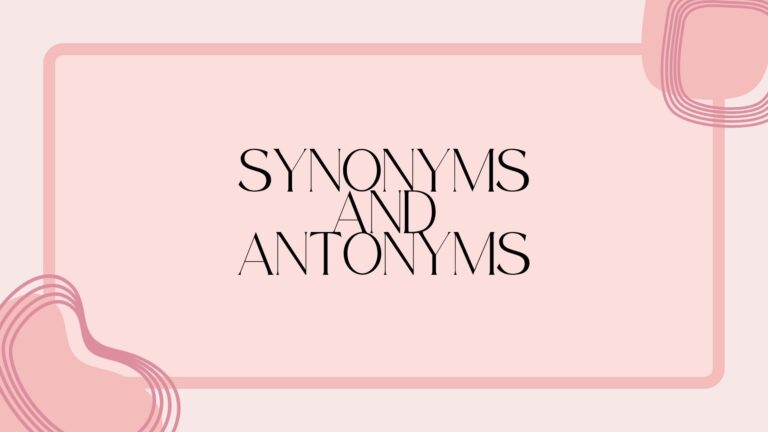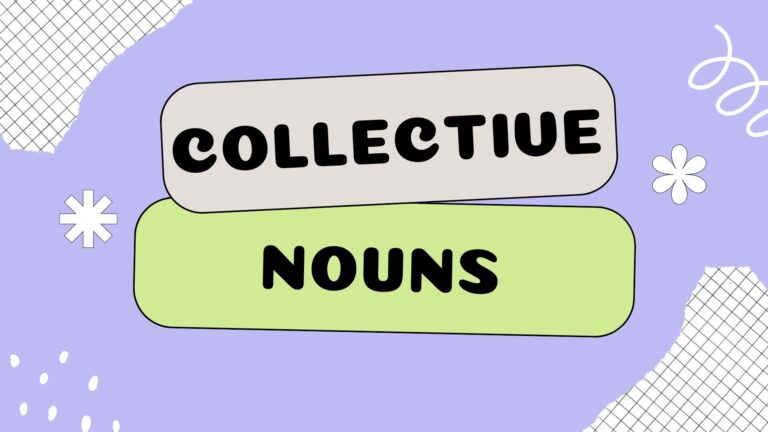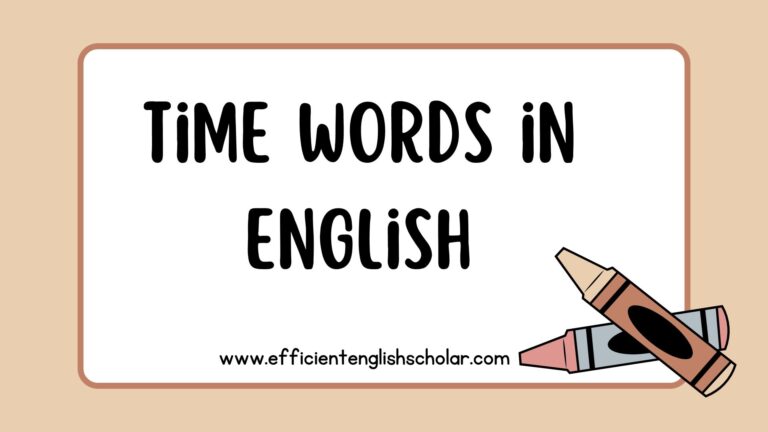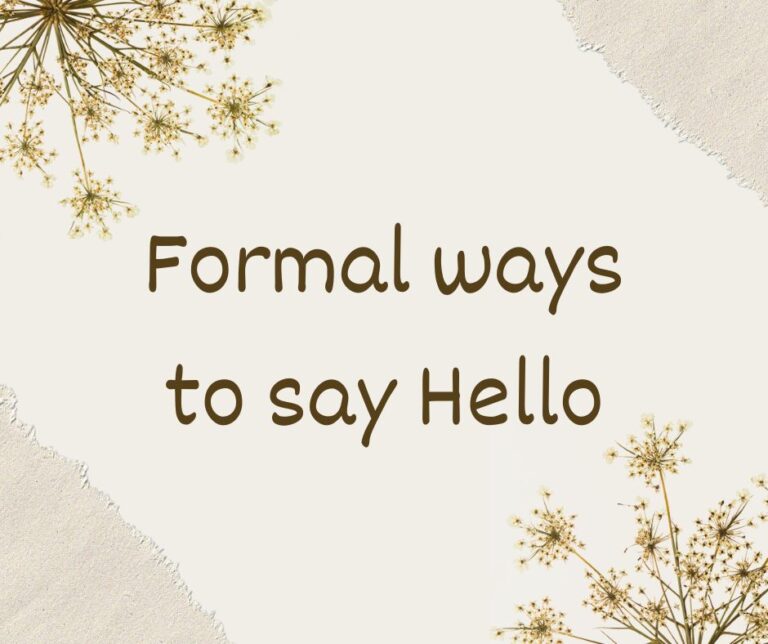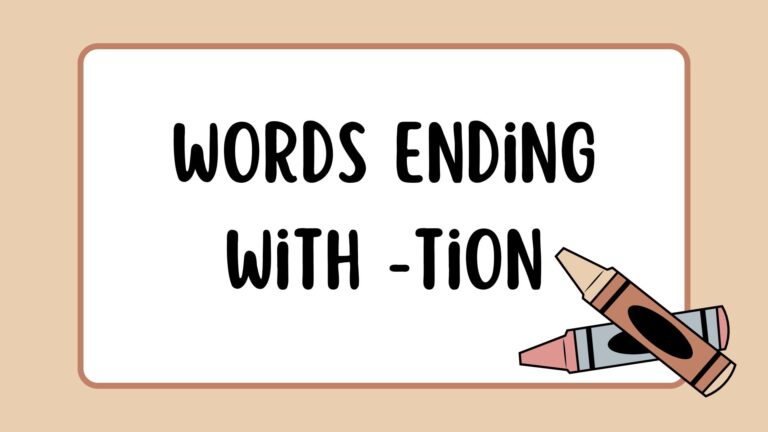Most Common Opposite Words List
Understanding opposite words is important for improving language skills in school and everyday talk. This article provides a list of common opposite words with helpful examples. By learning these antonyms, readers can express their thoughts more clearly and accurately.
Introduction to Opposite Words
Opposite words, or antonyms, help us understand and express complex emotions. They show the range of feelings like love and hate, adding depth to our language. By looking at these contrasts, we gain insights into balance in life, like day and night. This duality builds empathy by helping us see different viewpoints, as joy often comes after sadness.
Embracing opposite words improves communication, allowing us to better share our thoughts and feelings. In the end, antonyms are important for how we connect and understand human experiences.
Antonyms and Their Importance
Antonyms help us understand language and feelings by showing opposite ideas. They reveal the range of human emotions, like “love” and “hate,” and make us think about why we feel that way. Antonyms also encourage critical thinking by challenging our views and inspiring us to consider different perspectives.
In literature, they create tension and develop characters, making stories more engaging. Seeing these contrasts gives us insights into life’s complexities, enhances our vocabulary, and broadens our understanding.
List of Common Opposite Words
Here is a list of common opposite words pairs. These are useful for vocabulary building, grammar practice.
1. Hot – Cold
2. Big – Small
3. Fast – Slow
4. Tall – Short
5. Heavy – Light
6. Happy – Sad
7. Day – Night
8. Old – Young
9. Rich – Poor
10. Right – Wrong
11. Up – Down
12. In – Out
13. Black – White
14. Easy – Hard
15. Near – Far
16. Loud – Quiet
17. Strong – Weak
18. Full – Empty
19. Soft – Hard
20. Start – Stop
21. Win – Lose
22. Open – Close
23. High – Low
24. Clean – Dirty
25. Thick – Thin
26. Sweet – Sour
27. Light – Dark
28. Good – Bad
29. Wet – Dry
30. Push – Pull
31. Early – Late
32. Brave – Coward
33. Beautiful – Ugly
34. Above – Below
35. Alive – Dead
36. Buy – Sell
37. Before – After
38. Give – Take
39. Laugh – Cry
40. Accept – Reject
41. Agree – Disagree
42. Always – Never
43. Begin – End
44. Better – Worse
45. Bitter – Sweet
46. Busy – Lazy
47. Catch – Miss
48. Come – Go
49. Create – Destroy
50. Deep – Shallow
51. Defend – Attack
52. Difficult – Easy
53. Down – Up
54. Enter – Exit
55. Even – Odd
56. Fat – Thin
57. Fine – Coarse
58. Float – Sink
59. Forgive – Blame
60. Friend – Enemy
61. Give – Receive
62. Hard – Soft
63. Healthy – Sick
64. Hero – Villain
65. Honest – Dishonest
66. Inside – Outside
67. Joy – Sorrow
68. Kind – Cruel
69. Knowledge – Ignorance
70. Laugh – Weep
71. Left – Right
72. Less – More
73. Light – Heavy
74. Lose – Find
75. Love – Hate
76. Major – Minor
77. Male – Female
78. Man – Woman
79. Many – Few
80. Master – Servant
81. Maximum – Minimum
82. Narrow – Wide
83. New – Old
84. Noisy – Silent
85. North – South
86. Nothing – Everything
87. Obey – Disobey
88. Over – Under
89. Parent – Child
90. Pass – Fail
91. Peace – War
92. Present – Absent
93. Profit – Loss
94. Pull – Push
95. Question – Answer
96. Quiet – Loud
97. Raise – Lower
98. Rare – Common
99. Real – Fake
100. Remember – Forget
101. Rest – Work
102. Rich – Needy
103. Rude – Polite
104. Sad – Happy
105. Safe – Dangerous
106. Same – Different
107. Satisfy – Dissatisfy
108. Save – Spend
109. Secure – Insecure
110. Sell – Buy
111. Short – Long
112. Shout – Whisper
113. Shut – Open
114. Simple – Complicated
115. Single – Married
116. Sink – Float
117. Slow – Fast
118. Smile – Frown
119. Smooth – Rough
120. Sour – Sweet
121. Stand – Sit
122. Start – Finish
123. Stop – Go
124. Straight – Crooked
125. Strong – Fragile
126. Success – Failure
127. Sunny – Cloudy
128. Sweet – Bitter
129. Take – Give
130. Teach – Learn
131. Thick – Thin
132. Tight – Loose
133. Tiny – Huge
134. Together – Apart
135. Top – Bottom
136. Tough – Tender
137. True – False
138. Truth – Lie
139. Ugly – Pretty
140. Under – Over
141. Up – Down
142. Useful – Useless
143. Victory – Defeat
144. Visible – Invisible
145. Weak – Strong
146. Win – Fail
147. Wise – Foolish
148. Work – Rest
149. Yes – No
150. Young – Old
151. Active – Passive
152. Allow – Forbid
153. Advance – Retreat
154. Ancient – Modern
155. Arrive – Depart
156. Asleep – Awake
157. Awake – Sleep
158. Believe – Doubt
159. Bitter – Sweet
160. Borrow – Lend
161. Build – Break
162. Calm – Stormy
163. Cheap – Expensive
164. Clever – Stupid
165. Cool – Warm
166. Cruel – Kind
167. Dry – Wet
168. Dull – Bright
169. East – West
170. Employed – Unemployed
171. Empty – Full
172. Fasten – Unfasten
173. Fat – Slim
174. Final – First
175. First – Last
176. Forgive – Punish
177. Freeze – Boil
178. Fresh – Stale
179. Front – Back
180. Gentle – Harsh
181. Giant – Dwarf
182. Give – Steal
183. Harm – Heal
184. Hell – Heaven
185. Host – Guest
186. Increase – Decrease
187. Include – Exclude
188. Lead – Follow
189. Legal – Illegal
190. Major – Minor
191. Natural – Artificial
192. Optimist – Pessimist
193. Permanent – Temporary
194. Powerful – Powerless
195. Private – Public
196. Raise – Drop
197. Serious – Funny
198. Strength – Weakness
199. Support – Oppose
200. Victory – Loss
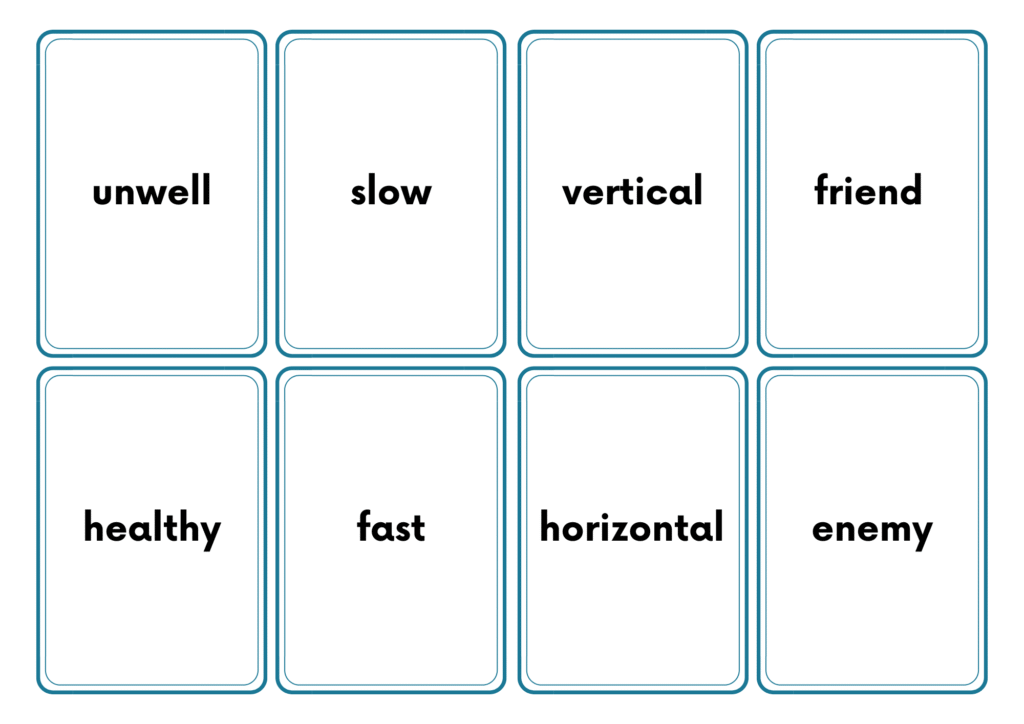
What are opposite words?
Opposite words, also known as antonyms, are words that have contrasting meanings.
Why are opposite words important?
Understanding opposite words enhances vocabulary, improves language skills, and aids in better communication.
Are there different types of antonyms?
Yes, antonyms can be classified into three types:
Gradable (e.g., “hot” vs. “cold”)
Complementary (e.g., “alive” vs. “dead”)
Relational (e.g., “buy” vs. “sell”).
Can context change the meaning of opposite words?
Yes! The context in which a word is used can affect its meaning and the effectiveness of its antonym.

